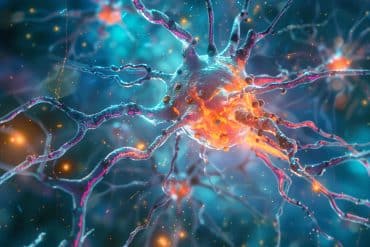Summary: Researchers made a significant breakthrough in understanding how ketamine treats depression-related social impairments, focusing on the drug’s effects in the mouse model.
Their study shows that (R)-ketamine, as opposed to (S)-ketamine, effectively restores neuronal activity in the anterior insular cortex, a region crucial for emotional regulation and social cognition. By treating mice subjected to chronic social isolation with (R)-ketamine, the team observed improved social interactions and cognition, attributing these enhancements to the revitalization of the anterior insular cortex.
This discovery underscores the potential of (R)-ketamine in treating social impairments associated with depression, suggesting a targeted approach to improving mental health and well-being.
Key Facts:
- (R)-ketamine vs. (S)-ketamine: The study differentiates the impacts of these two enantiomers of ketamine, finding that (R)-ketamine uniquely reverses decreased neuronal activation in the anterior insular cortex caused by social isolation.
- Improved Social Cognition: Mice treated with (R)-ketamine showed enhanced ability to recognize social cues, a key indicator of improved social cognition and interaction.
- Crucial Role of Anterior Insular Cortex: The positive effects of (R)-ketamine on social impairments are linked to its ability to restore function in the anterior insular cortex, highlighting the importance of this brain region in emotional regulation and social behavior.
Source: Osaka University
Well-being is important for everyone, especially when we feel lonely or isolated. Depression is a serious challenge for many people and finding an effective solution is key.
In a recent study published in Molecular Psychiatry, researchers from Osaka University used a mouse model of depression to reveal that one form of ketamine (a common anesthetic) in low doses can improve social impairments by restoring functioning in a specific brain region called the anterior insular cortex.

Ketamine is often used at low doses to treat depression, but its actions in the brain remain relatively unclear. Generally, ketamine refers to a mix of two different forms of ketamine: (S)-ketamine and (R)-ketamine. These two molecules are mirror isomers, or enantiomers—they have the same molecular formula, but their three-dimensional forms are mirror images of one another.
Although they usually occur as (S) and (R) pairs, they can also be separated into either (S)-ketamine or (R)-ketamine. Each is beneficial in treating depression, although their specific effects vary.
When the research team decided to test the effects of (S)-ketamine and (R)-ketamine on depression-like symptoms in mice, they first had to decide on an appropriate model. Given that depression and social impairments can be induced by long-term social isolation, they chose a chronic (at least 6 weeks) social isolation mouse model.
The researchers then used a method that allowed them to directly compare neuronal activation throughout the entire brains of mice treated with (S)-ketamine, (R)-ketamine, or saline (as a control) directly after behavioral tests.
“In this way, we were able to observe differences between (S)-ketamine and (R)-ketamine treatments in terms of neuronal activation across the whole brain, without having a predefined hypothesis,” says lead author of the study Rei Yokoyama.
“Notably, we found that chronic social isolation led to decreased neuronal activation in the anterior insular cortex—a brain region that is important for emotional regulation—during social contact, and that (R)-ketamine, but not (S)-ketamine, reversed this effect.”
The researchers also found that mice treated with (R)-ketamine were better at recognizing unfamiliar versus familiar mice in a social memory test, indicating improved social cognition. Moreover, when neuronal activity was suppressed in the anterior insular cortex, the (R)-ketamine-induced improvements disappeared.
“These findings highlight the importance of the anterior insular cortex for the positive effects of (R)-ketamine on social impairments, at least in mice,” says Hitoshi Hashimoto, senior author of the study.
“Together, our results indicate that (R)-ketamine may be better than (S)-ketamine for improving social cognition, and they suggest that this effect is dependent on restoring neuronal activation in the anterior insular cortex.”
Given that the rates of social isolation and depression are increasing worldwide, these findings are very important. (R)-ketamine is a promising treatment for isolation-induced social impairments and may contribute to a better quality of life in people with associated disorders.
About this psychopharmacology and depression research news
Author: Saori Obayashi
Source: Osaka University
Contact: Saori Obayashi – Osaka University
Image: The image is credited to Neuroscience News
Original Research: Open access.
“(R)-ketamine restores anterior insular cortex activity and cognitive deficits in social isolation-reared mice” by Rei Yokoyama et al. Molecular Psychiatry
Abstract
(R)-ketamine restores anterior insular cortex activity and cognitive deficits in social isolation-reared mice
Chronic social isolation increases the risk of mental health problems, including cognitive impairments and depression. While subanesthetic ketamine is considered effective for cognitive impairments in patients with depression, the neural mechanisms underlying its effects are not well understood.
Here we identified unique activation of the anterior insular cortex (aIC) as a characteristic feature in brain-wide regions of mice reared in social isolation and treated with (R)-ketamine, a ketamine enantiomer.
Using fiber photometry recording on freely moving mice, we found that social isolation attenuates aIC neuronal activation upon social contact and that (R)-ketamine, but not (S)-ketamine, is able to counteracts this reduction. (R)-ketamine facilitated social cognition in social isolation-reared mice during the social memory test. aIC inactivation offset the effect of (R)-ketamine on social memory.
Our results suggest that (R)-ketamine has promising potential as an effective intervention for social cognitive deficits by restoring aIC function.






